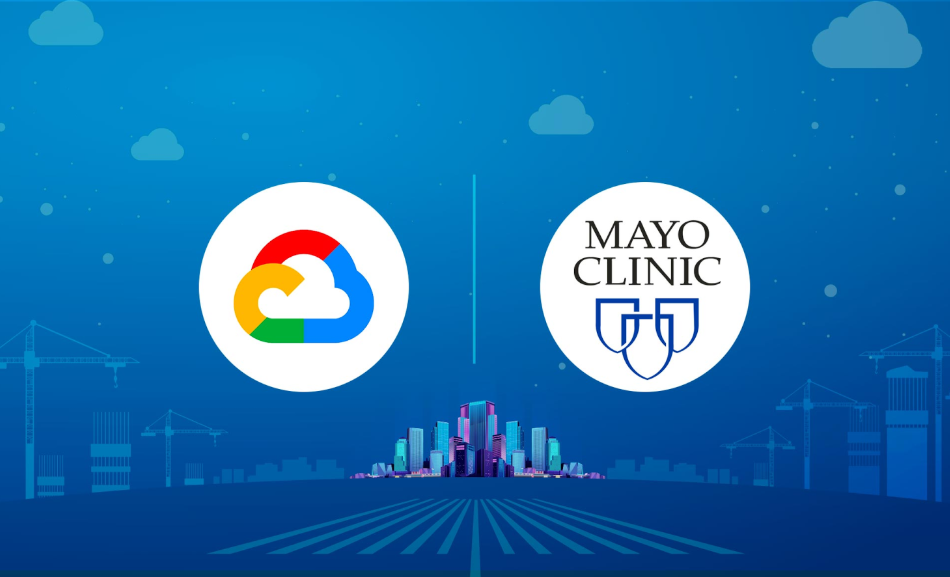 CLOUD
CLOUD
 CLOUD
CLOUD
 CLOUD
CLOUD
Google Cloud said today it’s collaborating with the Mayo Foundation for Medical Education and Research, better known as the Mayo Clinic, to bring advanced generative artificial intelligence capabilities to the healthcare industry.
To get the ball rolling, the Mayo Clinic is adopting a new service called Enterprise Search on Generative AI App Builder that will help to improve the efficiency of clinical workflows and make it easier for clinicians and medical researchers to find the data they need to improve patient outcomes, Google said.
The Generative AI App Builder is a tool that lets developers, even those with limited machine learning skills, quickly and easily tap into the power of Google’s foundation models, search expertise and conversational AI technologies to create enterprise-grade generative AI applications. By introducing Enterprise Search to the Generative AI App Builder, Google said, it can provide better access to data that’s dispersed across various medical documents, databases and intranets, making it easier for users to search and analyze.
That’s important, according to Google, because healthcare professionals have to use data from multiple sources, including medical records, research papers and clinical guidelines. The problem is that this data is often stored in various different formats and locations, making it difficult to find and access quickly. Enterprise Search on Generative AI App Builder changes that.
“Generative AI has the potential to transform healthcare by enhancing human interactions and automating operations like never before,” said Google Cloud Chief Executive Thomas Kurian. “Mayo Clinic is a world leader in leveraging AI for good, and they are a critical partner as we identify responsible ways to bring this transformative technology to healthcare.”
Google stressed that generative AI brings new capabilities that will allow healthcare organizations to generate real-time, personalized and unique interactions that weren’t possible before. Until now, AI in healthcare has always worked by scanning lots of data to identify patterns that enable greater efficiencies. With generative AI, practitioners can review their data in more sophisticated ways, Google said, and use it to create new content, images and more.
For instance, healthcare companies will be able to use tools like Generative AI App Builder to create applications that optimize workforce productivity, streamline administrative processes and automate repetitive tasks, Google said. That’s intended to give caregivers more time to focus on higher-value patient interactions.
As an early adopter of Enterprise Search on Generative AI App Builder, Mayo Clinic intends to look at how it can combine high-quality search tools with generative AI to bring the most vital data to doctors, clinicians and other workers in a conversational way. “Google Cloud’s tools have the potential to unlock sources of information that typically aren’t searchable in a conventional manner, or are difficult to access or interpret, from a patient’s complex medical history to their imaging, genomics, and labs,” said Mayo Clinic Chief Information Officer Cris Ross. “Accessing insights more quickly and easily could drive more cures, create more connections with patients, and transform healthcare.”
The Mayo Clinic has long been at the forefront of AI innovation in healthcare, said Constellation Research Inc. Vice President and Principal Analyst Andy Thurai. Notably, it partnered with IBM Watson Health almost a decade ago on AI-based cancer research and tools that aimed to match patients with clinical trials, he said. Given its longstanding desire to innovate, it’s no surprise that Mayo Clinic is one of Google’s first partners to look at the implications for generative AI.
“The initiative to search medical records in both structured and unstructured data in a single place makes a lot of sense,” Thurai said. “It can help healthcare providers automate low-risk, repetitive tasks using AI and free up scarce medical personnel to provide higher-value, higher-touch care to patients.”
Thurai said he has high hopes that Google’s expertise in generative AI can make a real impact this time around. He pointed out that IBM ultimately decided to ditch its Watson Health unit after deciding that it had failed to have any meaningful impact. He also pointed to Intel Corp.’s failed experiments in bringing AI to healthcare.
“Because most medical data is unstructured, it is very complicated to work with it,” Thurai explained. “But since those early efforts, AI-based unstructured data search, analysis and digitization has become much easier to implement. By adding generative AI and natural language processing on top, the Mayo Clinic and Google Cloud may finally be able to make it work.”
Adding to this optimism is the fact that Google has a longstanding relationship with the Mayo Clinic that dates back to 2019, when the two companies announced they were embarking on a 10-year strategic partnership focused on AI-powered medical research. In 2021, the companies announced the creation of a research hub located at the Mayo Clinic’s headquarters in Rochester, Minnesota, where they’re experimenting with various machine learning models to research “serious and complex diseases.”
Google said Enterprise Search on Generative AI App Builder is fully compliant with the Health Insurance Portability and Accountability Act, which pertains to rules that prevent sensitive patient health information from being disclosed without the patient’s consent or knowledge.
Support our mission to keep content open and free by engaging with theCUBE community. Join theCUBE’s Alumni Trust Network, where technology leaders connect, share intelligence and create opportunities.
Founded by tech visionaries John Furrier and Dave Vellante, SiliconANGLE Media has built a dynamic ecosystem of industry-leading digital media brands that reach 15+ million elite tech professionals. Our new proprietary theCUBE AI Video Cloud is breaking ground in audience interaction, leveraging theCUBEai.com neural network to help technology companies make data-driven decisions and stay at the forefront of industry conversations.